You've probably seen or heard about calf compression sleeves and socks. These "magic socks" have continued growing in popularity due to their many benefits — from quickened recovery time after exercise to increased blood circulation, reducing the risk of a blood clot in the legs.
That said, it's important to note that compression sleeves aren't regular socks–there is a proper time to wear them. Here, we'll break it down so you can maximize the benefits of calf compression sleeves.
When You're On Your Feet All Day
Are you a teacher coming off an 8-hour school day? Or a nurse finishing a 12-hour shift? Your legs are likely stressed if you stand or walk for long hours at a stretch. Calf-compression sleeves can help ease that pain as well as:
Reduce Leg Fatigue and Swelling
When you're on your feet more often, you may experience fatigue, heaviness, and mild leg pain. In the real world, this might look like servers with blisters or dancers with foot problems. Sometimes, swelling may even occur when blood pools in the legs due to long hours of upright standing.
Our compression socks can help remedy this problem. By applying pressure to the feet and ankles, blood flow from the feet back to the heart is increased while standing. This helps prevent blood from pooling in the legs, reducing leg fatigue and stopping swelling in the feet.
Help With Post-Stress Recovery
After a long day of standing, your legs need time to relax, whether you wore a sleeve during the shift or not. Wearing one during recovery can help speed up and increase its effectiveness, especially for nurses and jobs requiring shifts on consecutive days. Compression sleeves promote faster delivery of oxygen and nutrients to muscle cells, reducing muscle soreness, inflammation, and overall recovery time.
Prevent Varicose Veins
Poor blood circulation can lead to varicose veins, which enlarge and twist the leg veins. These can appear if blood pools in your legs and doesn't circulate back to the upper part of your body.
Using calf-compression sleeves helps prevent this and other side effects, such as cramping, weak joints, and a rare but severe condition known as DVT.
However, it's important to note that wearing compression sleeves incorrectly, such as during sleep or when lying down for extended periods, can cause blood pooling and increase the risk of conditions like deep vein thrombosis (DVT). Wear them only when you're active or directed by a healthcare professional.
When You're Traveling
Spending long hours on a flight or train can affect blood circulation. You might make a few stops to the bathroom during your trip, but more is needed. You'll likely still spend a significant amount of time sitting in the same spot, and during this time, blood circulation from your heart to your legs slows down. Wearing compression socks for flying is a great solution to this.
This could lead to swelling in the lower legs and feet after your trip, weak joints, and pain.
If you plan on taking a long journey–5 hours and above — then some calf compression sleeves should accompany you. They can:
Help Deter Blood Clots
A common worry for travelers is blood clots due to leg inactivity. Compression sleeves help with blood circulation in the lower legs by applying pressure to the area that pumps blood back to the heart from the legs. This action mimics exercising the lower legs, so your legs work even while stationary.
Prevent Swelling in Your Feet
Lack of leg movement for an extended period prevents blood circulation. Still, it also stops the flow of a fluid called lymph, which is present in the cells in your legs. When they stop flowing freely, your legs begin to swell as fluid pools in specific areas — it could take hours of constant leg exercise to get rid of the swelling after your trip.
Wearing a compression sleeve enables your lymph to move more freely and significantly decreases the chances of swelling.
When You're Running
Compression socks and sleeves have long been part of sports. You can spot them on players at nearly every NBA and NFL game, and awareness of their benefits has proliferated across sports and athletics, especially among runners.
Despite regular leg exercises, runners' leg muscles are more exposed to fatigue, tissue damage, and circulation issues than most other sports. Calf-compression sleeves can help:
Control Blood Circulation While You're Running
You may ask why you need a compression sleeve to help blood circulation while running. After all, you're mobile, and your legs are adequately exercised. Think of the sleeves as an enhancer or controller.
Blood circulates while running, but calf compression sleeves help maintain consistency and regulate blood flow. This counteracts the impact of gravity and prolonged running on the legs. This consistent oxygen flow to the legs keeps your calf muscles strong and fights off leg fatigue.
Moreover, calf compression sleeves prevent muscle oscillation by stabilizing your calf muscles, reducing the vibrations that lead to muscle micro-tears. This stabilization can help avert calf strains and other injuries, allowing you to run longer and recover faster.
Prevent Swelling and Cramps
A runner might get swollen feet during or after a run. Still, the most common cause is the build-up of fluids in the lower legs due to inconsistent or poor circulation. Lymph tends to pool in the lower legs sometimes, depending on the individual, which leads to swollen feet often seen shortly after a long-distance run. The pressure applied by compression socks prevents the build-up from happening.
Also, compression sleeves squeeze up against the calf, restricting movement and keeping the calf muscles in place. This increases endurance and reduces the risk of cramps and pain in the lower leg during distance running.
Compression sleeves or compression running socks can prevent re-injury and support muscle healing during rehabilitation for runners and athletes recovering from calf strains.
Helps With Leg Recovery
The recovery process is essential for runners. This is the part where you rest to allow your muscles to recover in preparation for your next race, and some men's and women's compression socks are designed to help you with this process. Increased blood circulation during recovery can reduce soreness and aid in the recovery of tired muscles. This is particularly helpful in the event of another race coming up in a short amount of time.
Although compression sleeves' primary benefit is recovery, some studies suggest potential minor improvements in endurance and performance during exercise, although evidence remains inconclusive.
When You're Expecting
During pregnancy, a woman's body undergoes many changes to help adapt to a baby's needs. One of these is an increase in fluids. Your body can produce up to 50% more fluid during pregnancy, resulting in swelling, muscle fatigue, and pain.
Nearly 80% of women experience discomfort in their legs during pregnancy. This discomfort is mainly caused by fluid pooling and is marked by reduced mobility. Calf compression sleeves often help counteract some of these side effects.
Calf Sleeves Prevent DVT
According to the Centers for Disease Control and Prevention, DVT is five times more likely to occur in pregnant women. Certain hormones released into their bodies make their blood more inclined to clot. As the uterus grows, it puts more pressure on the veins. Wearing a compression sock or sleeve helps increase blood circulation and fluid flow, preventing DVT.
Reduced Swelling
Swelling is one of the most common and expected side effects of pregnancy. Due to the excess fluid in the body, fluid can gather in certain parts of the leg and, with reduced activity, may pool long enough for the area to swell.
Swelling during pregnancy is mainly non-harmful, but in some cases, it can become excessive due to unusual amounts of body fluids that can occur in the latter stages of the pregnancy or twins. Compression socks place pressure on the lower legs, moving fluids around and reducing swelling.
Fewer Varicose Veins
Varicose veins are another common pregnancy effect, particularly in the third trimester. They aren't an immediate health risk like swollen feet but can sometimes be painful. They appear as dark purple, enlarged veins on the surface of your calf area. The increased blood flow in your legs from compression socks helps reduce the number of varicose veins during pregnancy.
Customization and Fit
The effectiveness of calf sleeves depends heavily on the proper fit and material. More than incorrect sizing or poor material choice can reduce their effectiveness or cause discomfort. Choosing the right size and type of compression sleeve to match your needs and body type.
Do It With Style
Many people have preconceived notions about calf compression sleeves. Some refuse to believe in their "magic," and others have many misinformed medical presumptions about them. In truth, the benefits of compression socks are simple. They are an effective way of increasing blood circulation in the legs, which prevents some side effects of poor circulation, like muscle fatigue, swelling, and varicose veins. They're also necessary for people with specific conditions, such as diabetic socks for those affected by diabetes.
And we're adding some style to it!
At Crazy Compression, we are taking calf compression sleeves and socks to the next level by adding some style to the substance. During long shifts at work, why not uplevel those scrubs with matching socks? For pregnant ladies, complement your pregnancy glow with an eye-catching knee-high sock to help you stay healthy AND look good.
Our socks come in varying designs and colors, so whether you're at work, traveling, lounging, or running a marathon — you do it in style.
Check out our online store and find the perfect sock for you!

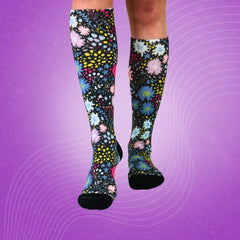
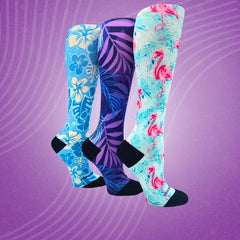
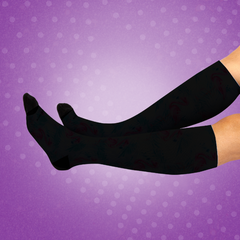
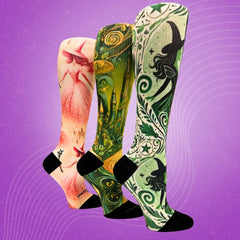
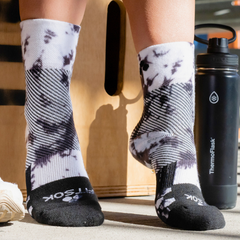
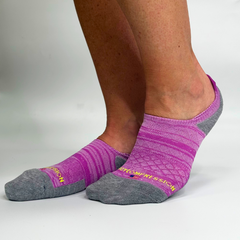
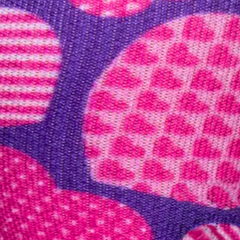
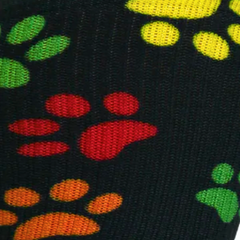
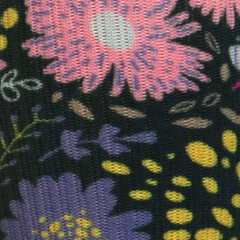

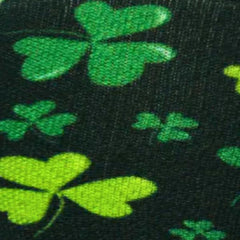
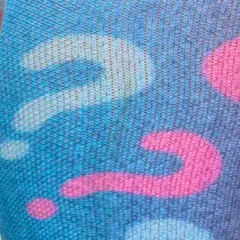
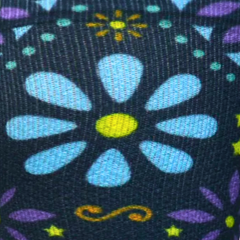

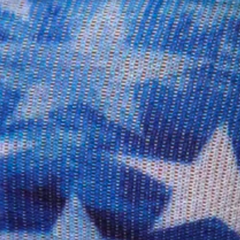
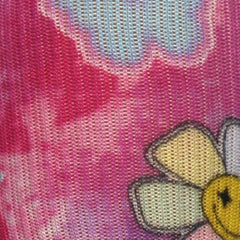

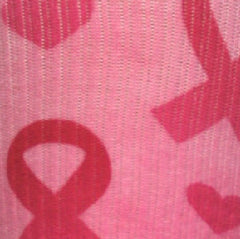
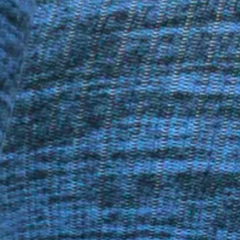
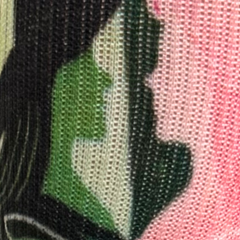
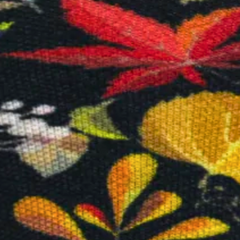
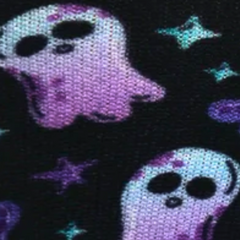
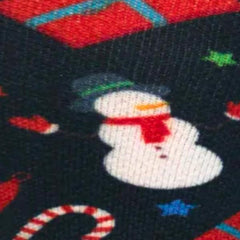

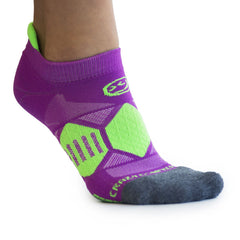

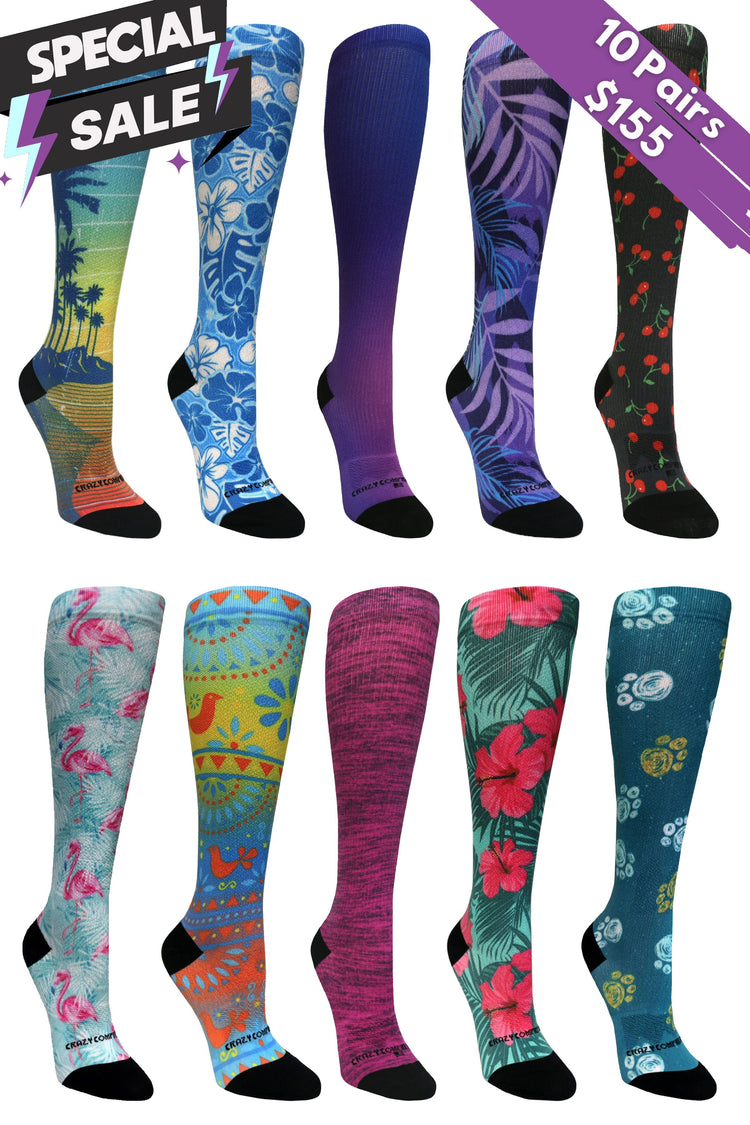



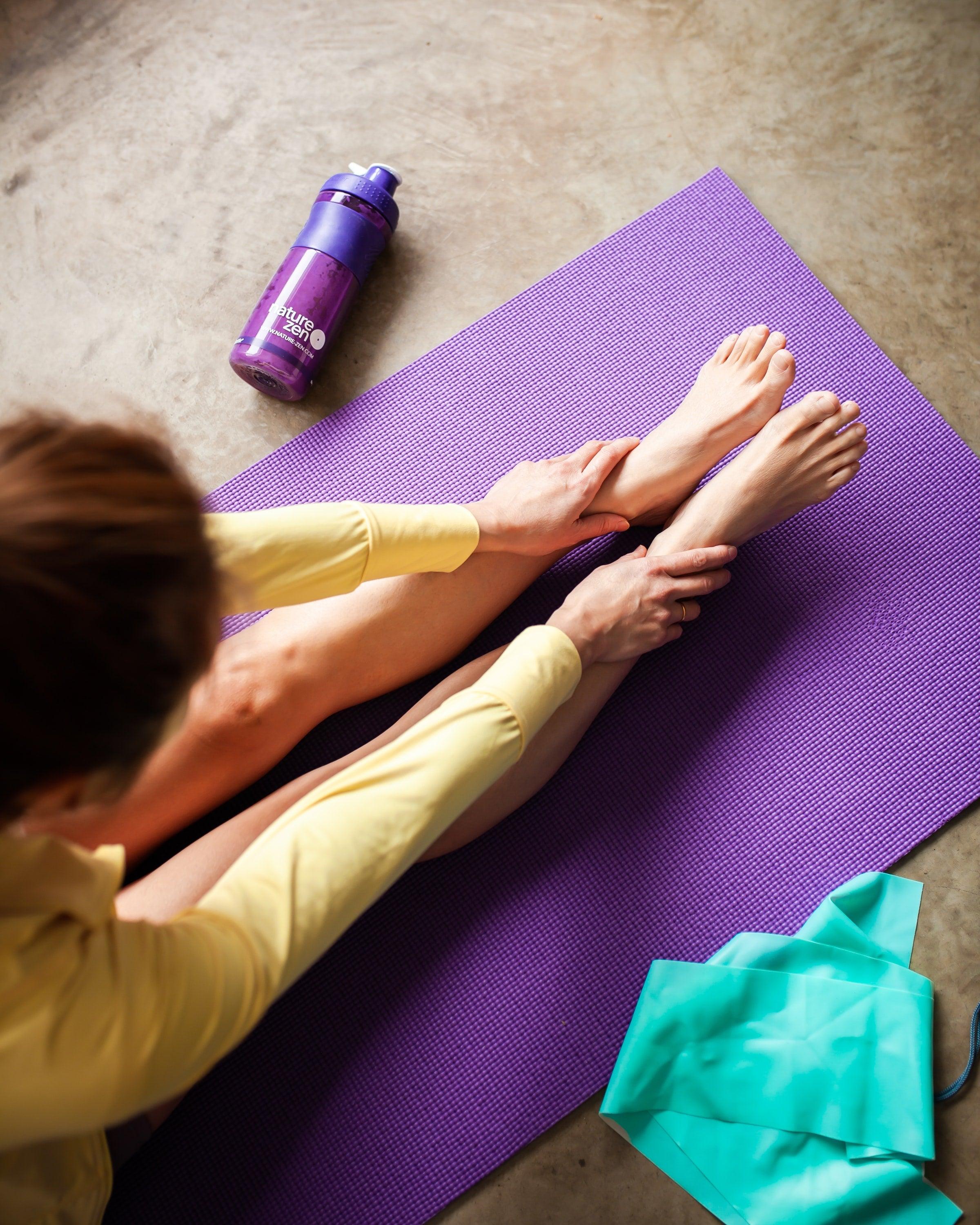

Leave a comment
This site is protected by hCaptcha and the hCaptcha Privacy Policy and Terms of Service apply.